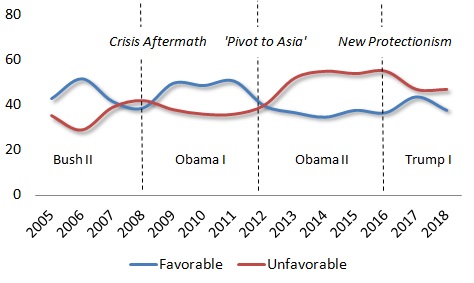Obama-Trump geopolitics changing US attitudes toward China, world
- By Dan Steinbock
 0 Comment(s)
0 Comment(s) Print
Print E-mail China.org.cn, September 11, 2018
E-mail China.org.cn, September 11, 2018

As veteran journalist Bob Woodward's new book "Fear: Trump in the White House" is shaking the Trump administration and a polarized America, Washington's trade hawks threaten to escalate their tariff wars. Historically, times of trade wars and protectionism tend to parallel negative attitudes toward other nations – and our era is no exception.
According to the Pew Research Center, American attitudes toward China have become somewhat less positive over the past year. Overall, 38 percent of Americans have a favorable opinion, down from 44 percent in 2017. In recent years, American attitudes toward other countries, particularly emerging and developing nations, have tended to show this trend.
According to Pew, attitudes toward China have fluctuated in a regular pattern in recent years, becoming more negative during the 2012 election cycle, but more positive in 2017, before this year's fresh decline. The title of the survey reflects the conclusion: "As Trade Tensions Rise, Fewer Americans See China Favorably."
Nevertheless, this ignores deeper causal links going far beyond the recent trade war and involve U.S. geopolitics in the post-Cold War, at the expense of economic cooperation.
How U.S. geopolitics is shaping negative China perceptions
Through the post-Cold War era, every presidential campaign has had its share of China-bashing, from Bill Clinton blaming George H. W. Bush for "coddling the butchers of Beijing" to Trump's allegation that "China is raping America."
Accordingly, positive perceptions of China have been systematically replaced by negative perceptions toward the end of the campaign seasons in 2008, 2012, and 2016.
In Obama's first term, perceptions were more positive because the White House's focus was on U.S. financial turmoil, not on China. To avoid the Great Depression 2.0, America needed the support of the rest of the world, and particularly that of China, which then accounted for half the global growth prospects.
However, after interest rates had been cut to zero, and rounds of quantitative easing began, President Obama opted for very different policies. As he launched his geopolitical "pivot to Asia," starting talks about a U.S.-led Trans-Pacific Partnership (TPP) that excluded China, American people got the message. From 2011 to 2014, favorable American attitudes toward China plunged from more than 50 percent to barely 35 percent.
This continued with Trump's 2016 presidential campaign, which blamed America's economic decline on China, and Hillary Clinton's Democratic campaign portraying China as a global military risk.
Nevertheless, once the election was over, the perceptions, once again, began to grow more positive, as trade tensions were relieved in 2017. However, fresh negativity emerged as Trump launched his tariff war against China (See figure).
Figure American Attitudes toward China

Source: Survey data from Pew Research Center
Old age cohorts, old China perceptions
Yet, the Pew survey does reveal something positive as well. There is a significant generation gap between those American age groups that came of age in the Reagan years, or during the Cold War – and more youthful American age cohorts.
Half of 18- to 29-year-olds (49 percent) express a favorable view of China, compared with 30- to 49-year-olds (37 percent) and 50 and older (34 percent). Among younger people growing up in a more multipolar era, many see opportunities not threats.
Unfortunately, the challenge is that U.S. tariff wars are being led by uber-Republicans, belonging to the oldest age cohort.
Trump himself is 72. His U.S. Trade Representative Robert Lighthizer, who initiated earlier trade wars in the Reagan era, is almost as old. Secretary of Commerce Wilbur Ross, is over 80. Even the China-bashing architect of the trade wars, Director of Trade and Industrial Policy Peter Navarro, and Trump's trade adviser, Dan DiMicco, former CEO of U.S. steel giant Nucor, are close to 70.
It is an ancient but potentially fatal combination. As old politicians and policymakers find it hard not to wage battles over their bygone years, they threaten to penalize the future of their children.
Dr Dan Steinbock is the founder of Difference Group and has served as research director at the India, China and America Institute (USA) and visiting fellow at the Shanghai Institutes for International Studies (China) and the EU Center (Singapore).
Opinion articles reflect the views of their authors, not necessarily those of China.org.cn.





